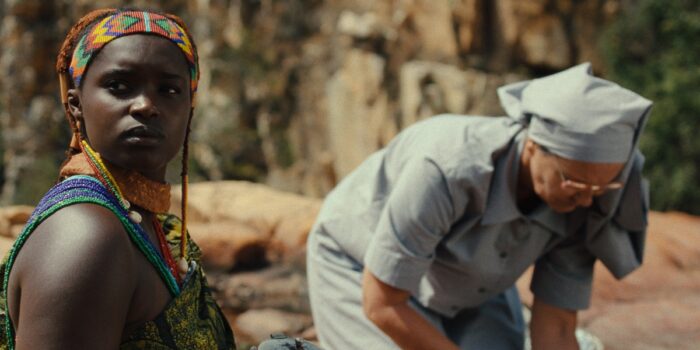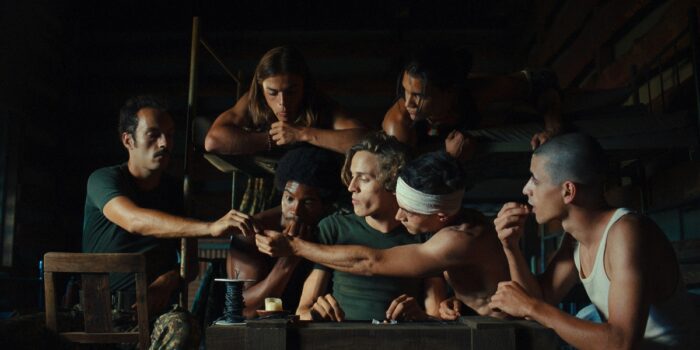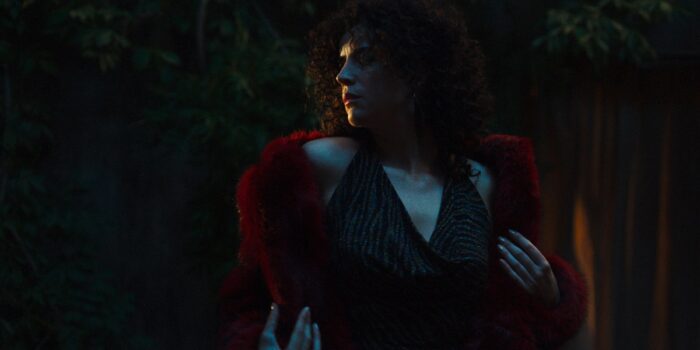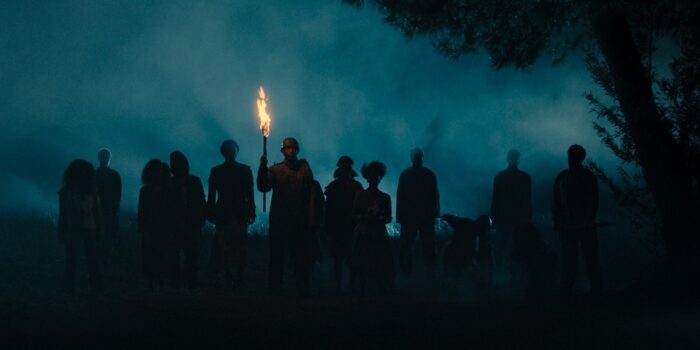Mystifying, unsettling, enigmatic, and shapeshifting, Tommy Guns—the second feature from Portugal-based Angolan director-writer Carlos Conceição (of 2018’s Serpentarius)—mashes up an unexpected but frothy brew of genre tropes. Switching from arthouse to combat to zombies to thriller, Conceição keeps his audience on their toes. It may defy logic and convention, but Tommy Guns is nonetheless an impressively shot, inventively concocted, and slyly satisfying critique of the colonialist practices that ruled in the director’s home country and across the globe.
Tommy Guns opens with something of a prelude, set in rural Angola in 1974, as Portugal’s 400-year colonization nears its close, but not without the continued presence of armed hostilities, just one year before the country’s independence from decades of Portuguese rule. Wealthy colonists are fleeing the country as Angolan revolutionaries gradually claim their land back. There’s no apparent protagonist; a sense of destabilization and unrest prevails.
A white female missionary (Leonor Silveira) tends to the eventually-fatal gunshot wound of an indigenous local, then is evicted from her home, sent on the run by a tommy-gun-toting gang of Black revolutionaries. It’s the first of several appearances of the eponymous “Tommy Gun” of the film’s title. Most will be aimed at the indigenous Black Angolans. Later, a teenage girl (Ulé Baldé), a member of a local tribe the missionary works with, meets a handsome young Portuguese soldier (Sílvio Vieira) in the forest. He lays down his tommy gun for a hesitant, awkward sexual tryst, only to pick it up again, and the film explodes in an act of ugly racial violence, for neither the first nor the last time.

There is, though, a small clue that the indigenous tribespeople at the mercy of Portuguese soldiers are not without their own power: in the gleaming moonlight, the earth of a makeshift grave shifts. It’s also a clue that Conceição is slyly playing with genre tropes and expectations, as his tale of guerrilla combat and unrest gives way, in its second half, to something else: the full-screen, blood-red-on-black title card appears, silencing the first narrative and signaling a second, some full 30-odd minutes into the film.
That’s quite the grand entrance. Gone, now, are the tribesgirl, the nun, and the soldier, in their place another group of callow young soldiers, in a compound apparently completely cut off from the outside world, where they serve their country under the brutal command of their colonel (Gustavo Sumpta). The seven of them revel in small pleasures—sharing, for instance, a single caramel exactingly divided among them into tooth-sized bits—but their purpose is uncertain. It’s difficult to know if the story has remained in the same timeline as the material preceding it, and the recruits seem the unlikeliest group of sallow-chested hipsters in runway-ready coifs. Their nighttime recon missions feel like scenes from Apocalypse Now, slow-paced and surreal, shot in elegant, rapturous cinematography by Vasco Viano.

The commander seems to have no certain mission, but he is determined to suss out any traitors to the cause and to mold the boys into men. For the former, he commands the execution of a black servant; for the latter, he hires a sex worker (Anabela Moreira), whose trippy Lynchian striptease to Aphrodite’s Child’s “Spring, Summer, Winter and Fall” ends, unsurprisingly, in more death, but sets her and the boys free. That is, at least, until the indigenous undead of Angola rise to make their case and reclaim their land.

So, whatever, exactly, Tommy Guns began as, it becomes something ever more audacious and weird, evoking, in all the best ways, Kubrick, Coppola, and Lynch, among others, bringing to life the ghosts—literalized as zombies—of Angola’s colonial past in a remarkably postmodern genre-fluid headtrip. I won’t go so far as to say it all makes sense, but I recognize that my own desire for some narrative coherence is probably something about which Conceição cares little. Tommy Guns goes its—his—own way, genre conventions and narrative traditions be damned.
The film is among the most sumptuously shot I can recall, with evocative nighttime landscapes and sparkling daytime scenes. Viano handles both with equal skill and aplomb, creative a feverish, lurid setting for the characters’ oblique interactions. The scenes that bring the dead to life are minor masterpieces of makeup, costume design, and lighting. Rather than let these descend into the B-movie shlock of flesh-eating, Viano and Conceição instead let the camera linger on a more unusual sight: zombies talking, calmly, clearly, rationally about the fate to which they and their land have been consigned, their bright eyes shining through the bluish nighttime.

Nothing stays fixed in Tommy Guns, at least not for long. One minute it’s arthouse drama, the next a guerrila combat tale, then a zombie flick, and for a time an escape thriller. But it’s also clear that the film is intended not only to disrupt genre conventions, but to deconstruct colonialist intentions, and not just in the history specific to Portugal’s rule of Angola. Tommy Guns is more a critique of the corruption of colonialism itself, linking violence, sex, and death to the practices of the exploitation of the indigenous—and a premonition of what might happen should the dead rise together against their oppressors.
Winner of Best European Film and the Youth Jury Award at the Locarno Film Festival, Carlos Conceição’s Tommy Guns opens theatrically on April 12 at BAM in New York City and April 21 at Laemmle Theaters in Los Angeles, followed by national expansion.



